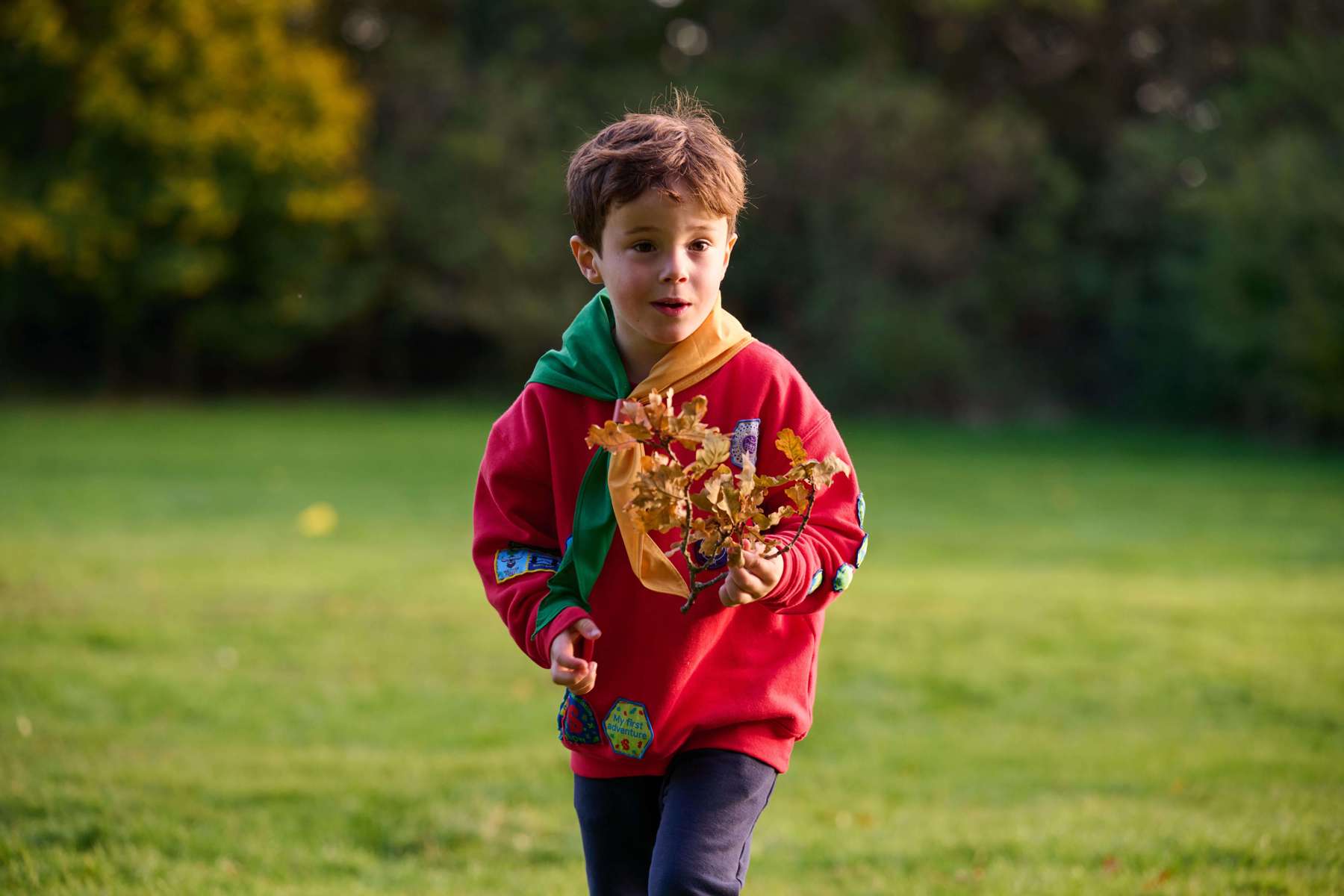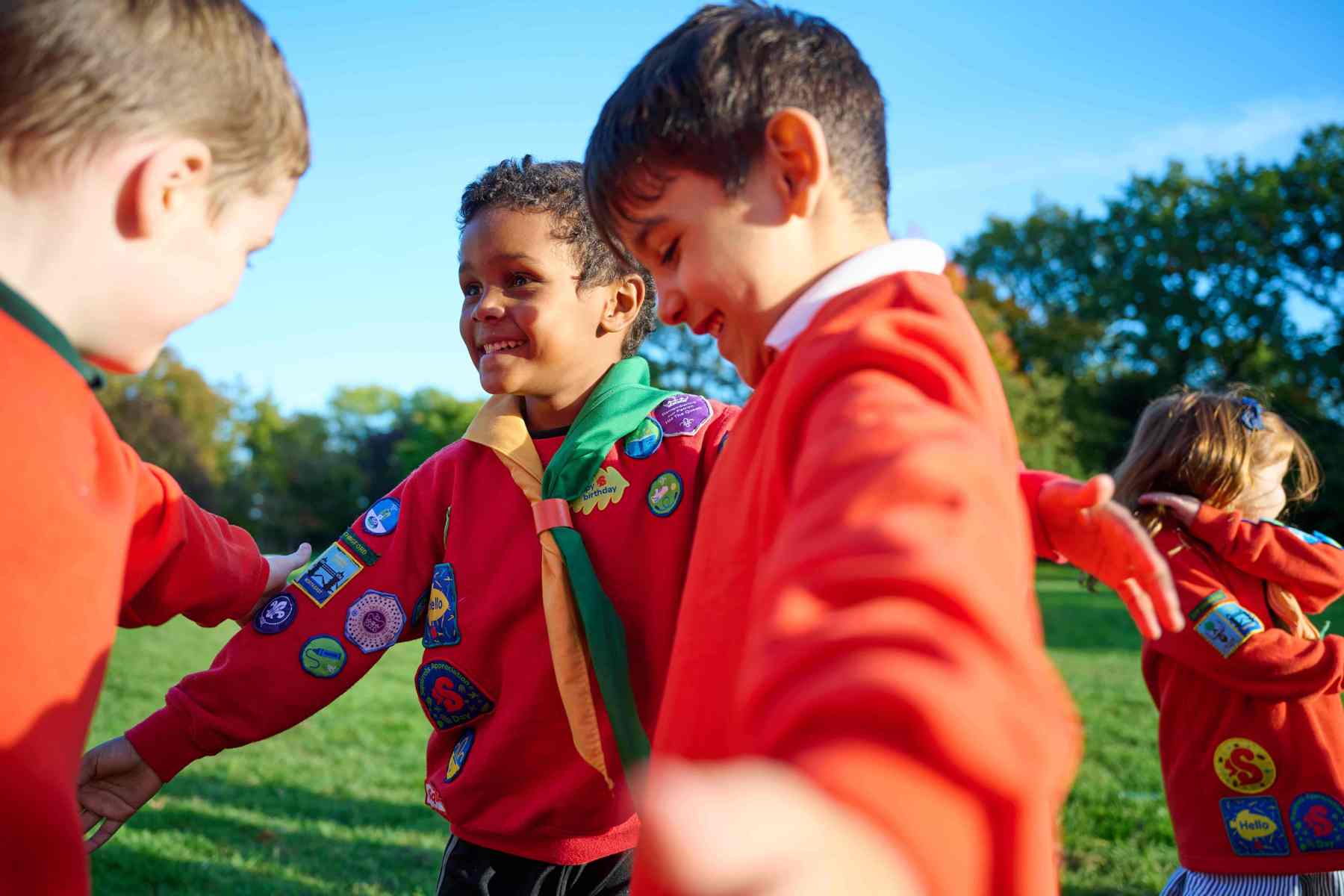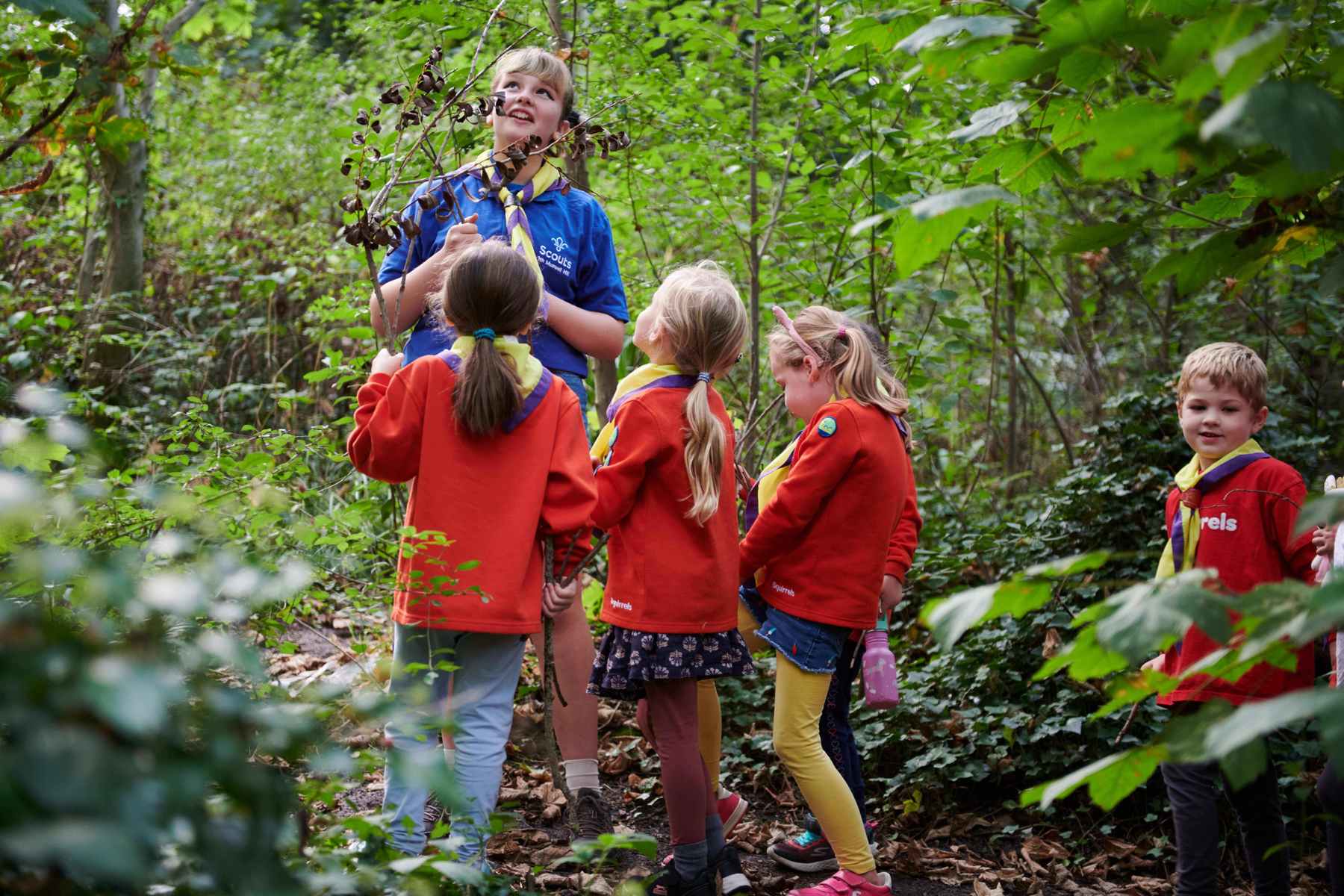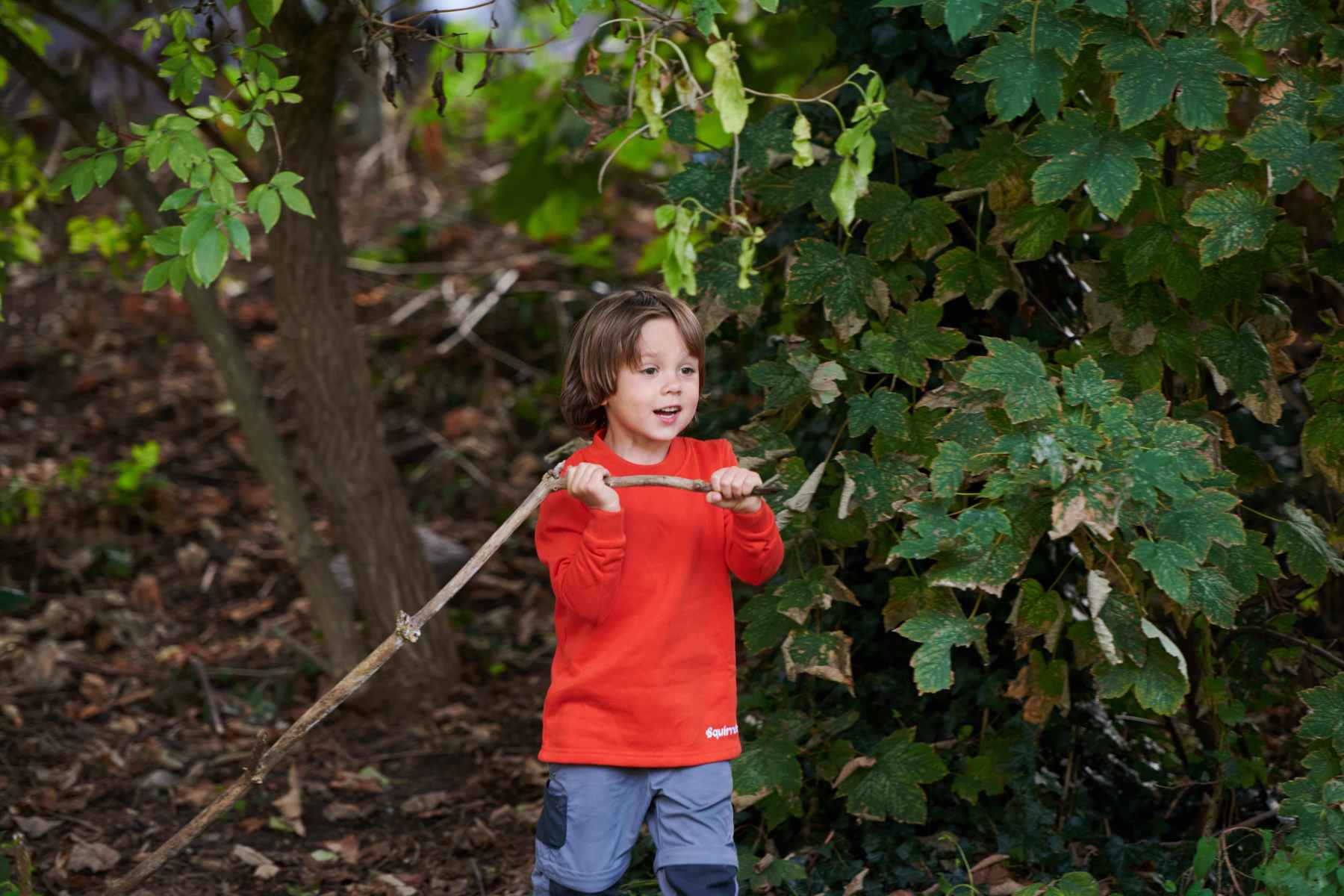6 tips for taking your Squirrels into the great outdoors
Outdoor learning and exploration are wildly positive for Early Years development.

We already know that Scouts provides young people with some of the best outdoor experiences imaginable.
For Early Years, so our youngest Squirrel Scouts, outside explorations and outdoor learning are also brilliant for development. Discovering nature supports gross motor skills, wellbeing and personal/social development.
Now that spring's here, and we’re moving in to summer, there’s even more reason for your Squirrel Drey to get out and grow, as the seasons change around you.
Although, a den is a great place to start, outdoor learning isn’t just about den building and there’s so much more for you to explore, wherever your meeting place is.
Here’s our six tips to planning outdoor activities:
1. Take up space and get messy
Even a small outdoor space will double, or maybe even triple, the size of your indoor space, so make use of the space around you. Wherever your based, you might visit a small woodland, use a school playground, go to a nature reserve or find a local park. Just being out and about under the sky opens a whole new world of play.
You can do everything on a bigger scale and try messier activities outside, which means more freedom and development of gross motor skills. Try to plan your games and activities around taking up space or ones that you can’t do as easily indoors, such as wide games, sports days, chalk painting or gardening. Take a look at our Squirrels outdoor games and nature activities.
Remember to always take your litter home, leave the space how you found it and tidy up.
2. Save room for the unknown
Running outdoor meetings provides more opportunities for open-ended sessions, as young people may get distracted by the world around them. These can create authentic experiences for the whole group and will make your session more immersive, so you need to leave room in your planning for the unknown.
Outdoor learning is curiosity-led, less controllable and experiential, giving room for youth-led investigation. A less controlled environment will also mean you can run the same session twice, with different results.
Maybe there’s a ladybird, a funny shaped cloud or interesting leaf that sparks the imagination of young people and wants to take the session in another direction, so let it. You could go on a bug hunt, learn to make instruments from natural objects, or spend time cloud-spotting and make what you see from cotton wool.
3. Make some noise
Young people should be seen and heard, loud and clear. Being outdoors means that there are less restrictions on noise, while being considerate to neighbours and those in the group who may be sensitive to loud noises. It’s an opportunity for young people to express their excitement without limitations, so do encourage that. It’s freeing and affirming. You could also be super quiet and listen to the noises of nature.
4. Get treasure hunting
The outside world is brimming with treasures, waiting to be found by scavenging Squirrels. For a four-year-old, finding a feather, a stone or an acorn is like striking gold. Treasure hunts that lean into the sense of magic that these found objects hold can spark imaginations.
Treasure hunts are also an excellent way to continue learning by bringing the outdoors, indoors. You might decide to run subsequent sessions with some of the found objects, exploring texture, weight and colour. Or, you could even create characters with the objects to help tell stories.
To protect your local environment, make sure you take back your treasures after you’ve finished learning with them. Returning treasure is a whole new session, too!
5. Risky play
If we want young people to grow into confident, capable and courageous young people, then we need to help them to calculate their own risks.
When playing outdoors, try to avoid saying ‘be careful’. This puts young people on edge, knocks confidence, instils fear and tells them they aren’t capable.
It’s also non-specific, and can start to become meaningless if young people are told to ‘be careful’ again and again. What do they need to be careful of?
That of course doesn’t mean we should encourage dangerous behaviour. To cultivate a positive sense of self, try using:
- ‘Do you feel… (safe, stable, in control?)’
- ‘Look around you…’
- ‘Can you notice… (rocks, branches, other people running)’
- ‘Are you feeling… (safe, tired, excited)’
6. Reflections
Reflecting on experiences outside will help to foster a love of nature. Helping them to notice the difference between the outdoors and the indoors will help young people to develop a language for the natural world.
You could ask them:
- How does it feel different inside to outside?
- What colours do we see indoors and what colours did we see outside?
- What animals/objects/smells did you notice and how did they make you feel?
- What do you like about the indoors and what do you like about the outdoors?
Listen to the things they loved the most to help you to plan future sessions, where you can explore even more.

Stories from Squirrel Dreys
‘The Squirrels love to get outside. We often go on daytrips to Thetford Forest - it's an amazing space and free to visit. At our meeting place, we only have a concrete pad and grass field but the forest is just a five-minute walk away. We visited back in February for some early spring bird and deer spotting. Our Squirrels get to run wild in the woods, make Dens with the fallen branches and play on the rope swings. Just being allowed to explore is what they love. Lots of them don’t have access to outdoor space at home, so we know it’s really important to bring them outside as much as we can. The forest has lots of new trails that we’re excited to venture out to this spring.’
Lesley, Bowthorpe Scout Group

‘We took the Squirrels stargazing at Dartmoor. Sadly, we couldn’t see the stars due to cloud cover, but we improvised! We used some software on the tablets to look at the constellations and learn about which stars were above us in the dusky sky, and which were below. After exploring the sky and finding the planets, we played games as night crept in and lined up like planets around the sun. The Squirrels favorite part of the session was finding the stars that were shaped like animals!’
Danielle, 1st Keyham Scout Group

Wherever you are, your Squirrels will love the chance to explore the wide world outside your meeting place. Please share your outdoor adventures over the Spring and Summer months with us by filling in this online form or posting on Facebook. We’d love to hear what you and your Drey have discovered and how it had a positive impact on development.